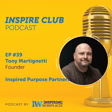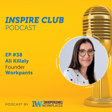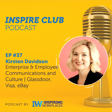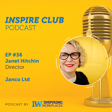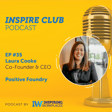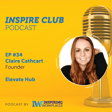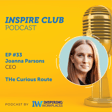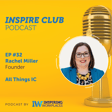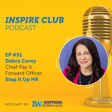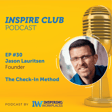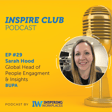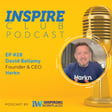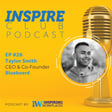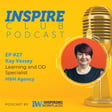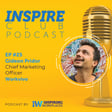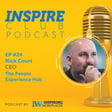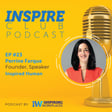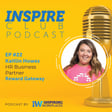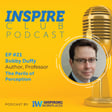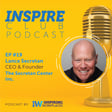Become a Creator today!Start creating today - Share your story with the world!
Start for free
00:00:00
00:00:01

Inspire Club EP #20 - Daniel Crosby
In this episode we talk with Daniel Crosby, Chief Behavioural Officer at Orion Advisor Solutions
Dr. Daniel Crosby is a psychologist, behavioral finance expert and asset manager who applies his study of market psychology to everything from financial product design to security selection. He is co-author of the New York Times bestseller Personal Benchmark: Integrating Behavioral Finance and Investment Management and founder of Nocturne Capital. He is at the forefront of behavioralising finance. His ideas have appeared in the Huffington Post and Risk Management Magazine, as well as his monthly columns for WealthManagement.com and Investment News.
We hope you enjoy it.
Recommended
Transcript
Introduction to Inspire Club Podcast
00:00:00
Speaker
Hello, hello and welcome to the Inspire Club podcast brought to you by Inspiring Workplaces.
00:00:11
Speaker
I am your host Ruth Dance and I'm back again for another episode of Inspire Club. I share the duties of hosting with my colleague Matt Manners in the team Inspiring Workplaces and this is my favourite 30 minutes of the week where I get to interview people, incredible, insightful people from all over the world.
00:00:30
Speaker
This week sees the close of our summer series where for the last six weeks we've been bringing you daily live learning from amazing speakers and case studies around the world on the amazing work they've been doing during the pandemic and creating inspiring workplaces. We're also really excited seeing the finalists of the Global Inspiring Workplaces Awards too. Definitely ready for a well-earned summer break.
Guest Nomination and Introduction
00:00:54
Speaker
But before we do, we're not going to start a break without an amazing episode of Inspire Club.
00:00:59
Speaker
So I'm the Managing Director of the Inspiring Workplaces Academy, and I'm sure you've met me before, or if not, you've maybe attended one of our workshops or been involved with us before. And just like in the 1990s classic Fight Club, we only have one rule. And our one rule is that each guest must share a story of one person in this world that has inspired them along the way, putting positivity out there and thanking someone who maybe had no idea. It could be a past colleague, but it could be anyone from outside of the world of work as well.
00:01:29
Speaker
So if anyone's listened to any previous episodes of Inspire Club, you'll know that we always ask our guests to nominate someone else to be a guest on Inspire Club. And today's guest is a nominee from a previous guest, Matt Gosney, and he nominated Dr. Daniel Crosby. So let me introduce him. Daniel, are you there? I am here. Great to be with you, Ruth.
00:01:52
Speaker
Hi, thank you so much for joining us for Inspired Club today. Do you have any idea why Matt Gosney recommended you? Well, he's clearly a person of great taste and sophistication. And so he recognizes talent when he sees it. No, Matt and I share a love for studying the human mind and human behavior. And so I imagine that's why he made the recommendation.
00:02:18
Speaker
Amazing.
Daniel Crosby's Background and Career Transition
00:02:20
Speaker
And Daniel would you like to give our listeners a brief synopsis of who you are?
00:02:29
Speaker
Yeah, so I am a clinical psychologist by education, my PhD is in clinical psychology. So I actually entered the world of psychology to be a shrink, right, to have you lay on my couch and talk to me about your mom and dad. But somewhere in that mix, I got diverted
00:02:49
Speaker
into the psychology of money. So I'm the son of a financial advisor. I found that while doing my clinical medical residencies, that I was probably better suited for less stressful pursuits than these sort of daily grind of medical psychology. And so I sought out sort of business applications of why people do the things that they do.
00:03:16
Speaker
And so I found my way to this world of behavioral finance, which is effectively the study of how people make decisions with money. So I study human behavior, I study financial decision making, I study everything from our physiology to our sociology to environment and how these impact the way we think about and make decisions with money. So it's been a great ride and a great application of my degree.
00:03:44
Speaker
Wow. And I imagine the last 18 months has really challenged that as well,
COVID-19 and Financial Insights
00:03:50
Speaker
even more so. I bet it's been fascinating for you. Yeah, it's been an incredible 18 months. I mean, from the panic of the early days of COVID to the subsequent, much to my surprise, sort of bubble and greed and mass consumption,
00:04:09
Speaker
that we saw to all of the cryptocurrency and the meme stocks. There have been weeks where I haven't slept much because I've been up late reading up about all the crazy things going on in the various markets. So it's been an awesome time to be in the field. Wow, yeah, I can only imagine. And you've authored a book, right?
00:04:31
Speaker
A few. So I've written three behavioral finance books and a couple of others. But my best two books are The Laws of Wealth and The Behavioral Investor. Both of those have gotten a great reception and have been translated into a number of languages and won some awards and stuff. So those are a great place to start if you're interested in sort of the mind and the markets, if you will.
00:04:58
Speaker
That's so interesting. We work with many workplaces all over the world who are really striving to be inspiring and to retain their people and to be productive and profitable and everything else.
Financial Wellbeing and Workplace Education
00:05:13
Speaker
And one of the subjects that
00:05:15
Speaker
has been coming up a lot over the last 18 months has been around wellbeing, right? I think that kind of really stands out that financial wellbeing, like people's personal stance and how there's some sort of responsibility that organisations need to start taking in supporting people with their financial wellbeing, not by giving them money, but around education, right? Something that we were never really taught a young age. So it's a really, really prominent subject at the moment.
00:05:46
Speaker
Yeah, I think you're going to see financial wellness and financial education as sort of an HR benefit. I think you're going to see that more and more and more. I can't speak for other parts of the world, but here in the US where I live and I imagine it's the same in most of the world, every year since the American Psychological Association
00:06:09
Speaker
started measuring what stresses Americans out. Money is at the top of the list every single year. And I don't imagine it's different in other parts of the world. So this is people's biggest worry. I mean, it's the biggest cause of divorce. It's the biggest cause of contention within relationships. So I think employers who empower their folks to better understand and better deal with money are doing them a huge, huge service.
00:06:38
Speaker
Amazing, so I hope anyone that's listening right now that's an employer, if you don't have that high on your agenda, well, Dr. Daniel Crosby is telling us exactly why it should be.
Inspiration from Mentor John Nolan
00:06:48
Speaker
I need to start with the first question and our first rule of Inspire Club though, which is, please can you share a story of who has inspired you along the world of work and why?
00:06:59
Speaker
So I will start with the person who I consider my mentor. His name is John Nolan. He will be super embarrassed that I've mentioned him. He's a very humble person. So to provide a little back story on my inspiration,
00:07:18
Speaker
So I grew up in a state called Alabama, which again, not to be so America-centric, but Alabama is probably the poorest, least educated, most out of shape, most backwards of all of our great 50 states. It's a place that gets disrespected a lot. It's a place that gets picked on a lot. And it's a place where you tell people you're from there. You sort of get sideways glances.
00:07:47
Speaker
So what John Nolan did for me was a couple of things. I mean, first of all, he taught me to be proud of where I was from.
00:07:55
Speaker
So this is a person who was in the military. He was a green beret. So sort of like elite forces right in the military learned how to be a spy in the military and then took that that spy craft that that he learned in Vietnam and other places and applied it to the corporate world. So he came home and started
00:08:22
Speaker
a corporate espionage company that would effectively use deep insights into human behavior to get corporate executives to say too much about their strategy and things and give competitive advantages to other folks. So a very sort of strange niche part of the world
00:08:44
Speaker
But suffice it to say, Mr. Nolan has incredibly deep insights into human behavior. He was very professionally and financially successful. But the cool thing is you would never know it.
00:09:00
Speaker
You know, he drives an old truck. He dresses, you know, like he dresses like the person next door. And so what he did that inspired me is he just gave me his time, right? He gave me his time. He shared with me his insights into human behavior. He would meet me for a bagel.
00:09:22
Speaker
a bagel and a diet coke and talk to me about how to build a business, how to hire, how the human mind works. And I mean, at the time that he started doing this, I was no one to bet on, right? I mean, I was young, I was stupid, I've had some success since then, but he saw something in me
00:09:47
Speaker
that I think would have been hidden to most folks. So he taught me how people work. He taught me how business works. He had faith in me when I think few others did. And he taught me to be proud of the place that I'm from. And for all those reasons, he's a huge professional inspiration to me.
00:10:08
Speaker
Wow, John Nolan, bagels, spies, setting up businesses, Diet Cokes. I don't know if you said Diet Coke, you definitely said Coke. Lots of Diet Coke, that's right. Lots of Diet Coke, but giving up your time, like time is such a precious commodity for us all, right? Like it's such a precious gift and giving up your time to help others, exactly like you're doing today, right? You're sharing, you're giving up your time to help others for the greater good. I think that's just
00:10:37
Speaker
greatest gift you can give anyone and you know it still sticks with you now from when you were I mean you still look like a young chap to me but from when you were when you were a young stupid chap like you like yourself to scribe yeah well well done to John Nolan um you've given us a little bit of insight into how you got into where you are and through your father being in finance etc but
00:11:06
Speaker
What gets you up in the morning?
Purpose and Financial Decision-Making
00:11:10
Speaker
What's your purpose?
00:11:12
Speaker
So what's interesting is I feel like this is a little bit of a tautology. It's a little circular, but I think that my purpose is to help other people find their purpose. Even though I work in finance, I don't really love money. Like I don't find the study of finance in and of itself to be particularly rewarding. But what I do find rewarding
00:11:38
Speaker
is helping people understand how their goals and their purpose and their why, if that's correctly positioned in their financial life, can guide them to make a host of other good decisions. So there's fascinating research that shows that people who look at a picture of their children before they make a financial decision were twice as likely to save money. We can inject the power of why
00:12:06
Speaker
back into something as seemingly sort of cold and sterile as talking about money. So my life ambition is to write a book on sort of helping find your why. It's sort of audacious to say like, I'm gonna be the guy that writes a book on the meaning of life, but that is what I wanna do. That is what I wanna do one day. So that for me is the big thing.
00:12:31
Speaker
is I don't know that there is one correct why, but helping people be thoughtful about the path to choosing a why is very rewarding for me.
00:12:43
Speaker
Yeah, that's so interesting. Makes me realise I should probably take a picture of my three children around with me more before I make financial decisions. That's so interesting. And it's what a purpose, what a get me out of bed purpose is I want to help other people find their way. I want to help other people understand that and the impact that that has as well. That's just amazing.
00:13:09
Speaker
We just talked a little bit around financial wellbeing being a key priority and if it isn't, it probably should be for businesses.
Hiring, Wellness, and Work-Life Balance
00:13:17
Speaker
But what do you think is the major workplace priorities for businesses either in Alabama or across wherever you are now or across the globe? What do you think should be the workplace priority right now?
00:13:33
Speaker
I feel like I have a lot to say about this. Before I made my way to behavioral finance, my first job out of college, out of grad school, was doing pre-employment assessments of bankers. So I was doing pre-employment IQ and culture fit and other assessments.
00:13:54
Speaker
And that, to me, was powerful work. Now, it's work that can be misused. We know that that work can be biased, it can be, you know, miscalibrated, and it can actually be used to harm and keep people who belong in the workplace out of the workplace. So it has to be done thoughtfully.
00:14:14
Speaker
It has to be done with an eye to promoting a diverse and inclusive workforce. But I think hiring the right people
00:14:24
Speaker
I still think we're still in the dark ages about how to hire. All of the research around the hiring process shows that it's archaic. We hire people based on sort of a short conversation with them, which is predictive of nothing. So I think there's a ton of work to be done about building a science of how to make great hiring decisions.
00:14:50
Speaker
I think there's more work to be done around promoting wellness. Iceland published the results of a study this morning talking about them going to a four-day work week.
00:15:02
Speaker
and they've had enormous productivity gains as well as quality of life gains. So I think a lot of what we view, especially in America, because America is sort of uniquely bad at this, a lot of what we view as sort of the way we ought to work is based in old ideas, old industrial ideas. So I think we need to restore some balance
00:15:27
Speaker
I think we need to be more like Europe and not taking ourselves so seriously and not working so hard. I think we need more vacations. You're talking about going on a summer hiatus. That doesn't happen here.
00:15:45
Speaker
It's really a shame and we're sort of working ourselves to death. So I think there's work to be done on financial education and wellness. I think there's work to be done around promoting a more sort of humane and balanced workplace. And I think there's big work to be done on how we hire people because sort of this conversational method
00:16:07
Speaker
It's prone to a lot of bias. It's prone to groupthink. It's ineffective. I just think there's big strides we can make there. Yeah, absolutely. It's so interesting. A lot of the conversations I have at the moment are how the pandemic was a catalyst for a lot of things that were already happening, whether that's hybrid working or through technology. But actually, as we're chatting right now, we realize that still quite a lot of things are still in the dark ages.
00:16:32
Speaker
You talk about the hiring process just based on maybe a 30, 40 minute conversation, maybe twice, maybe three times if you go through three rounds of an interview. I didn't marry my husband after three interviews, you know, I mean, it took him 10 years to propose.
00:16:47
Speaker
So, you know, why are we hiring people and bringing them into what could be a really loving and long and really important relationship with our organization over a 45 minute chat where they could really say anything to you. I've watched the TV show, Love is Blind, have you seen that? I mean, they put more science into that than we do into hiring people. Yeah.
00:17:15
Speaker
It's really interesting those three priorities and I completely agree with you. I saw the news this morning about Iceland as well in the four-day working week. It's something that a team at Inspiring Workplaces were looking at moving towards and how we get there. I would agree that in comparison to the US, Europe is definitely further along in those conversations.
00:17:36
Speaker
and I wish you all the best and I really hope that you can start to really take some of the research that we're seeing come out. That's really important. We talked a bit about John Nolan and the advice he gave you is about being proud of where you're from and he really believed in
Family Over Work: Advice from Daniel's Father
00:17:53
Speaker
you. Is that the best advice you've ever been given or if you had other advice that's kind of stayed with you?
00:17:59
Speaker
Probably the best advice I've ever been given is relatively simple, and it's from my dad. He always asks me, are you putting first things first? This is basically a nod to family. Like you, I have three young children and am married.
00:18:22
Speaker
There's moments that you never get back. And I think the tendency is for us in the West to work too hard, to focus too much on money. And what's been interesting for me is to research money and the ways that it does and it doesn't improve quality of life.
00:18:41
Speaker
So there's a few things we know about money, right? We know that at a certain level, it's about 75 to $80,000 here in the US. Below that, every incremental dollar does make you a lot happier because it takes about 75 or $80,000 to be able to live in a safe place, to have insurance, to send your kids to a nice school, you know, to do these things. But above that number,
00:19:10
Speaker
which is probably about 130% of the average US salary, but above that number, happiness doesn't increase. So being middle class does improve happiness. It allows you to buy some peace of mind, to cover an emergency, to be safe and well taken care of, well fed.
00:19:31
Speaker
But above that, money doesn't buy happiness. And we find that the way that we can spend money to buy happiness is to spend it on building relationships, time with people we love, and not doing things that we hate. So if we don't like gardening or mowing our yard or whatever, we can get out of that. If we don't like cleaning our house, getting someone to clean your house gives you some incremental happiness.
00:19:57
Speaker
But, you know, my dad is always encouraging me to sort of recenter on family, recenter on long term relationships and the things that matter because all of this business stuff is fleeting. You know, all of it is fleeting and all of it's candidly kind of unimportant when held up next to things like, you know, children and family. Yeah, I think nothing taught me more than that than the pandemic when we were in lockdown.
00:20:25
Speaker
And we couldn't spend money. And all we could do was focus on each other. And we came out of that saying, right, whenever the kids have a birthday next, they're not getting a thing. We're going to do an experience. That's where we're going to spend our money differently. It does tie in with a friend of mine, James Wallman, who wrote the book Stuffication and talking about spending money more on experiences and that we have too much stuff. And then he wrote another book on time and how to spend it.
00:20:55
Speaker
And he talks a lot about the experience economy and it really, really got me thinking about where are we spending our money or even our efforts and our energy, right? I know you're a money man, but where are we putting it and are we spending more on the things that are important? And nothing has shown me that more than having twins two months before we entered into a pandemic,
00:21:20
Speaker
and then where I need to spend my time and energy. So speaking of the pandemic, and I mean this might not be a pandemic thing, but it's definitely a key question for the times we're living through at the moment.
Stress Management Techniques
00:21:31
Speaker
How do you combat stress?
00:21:35
Speaker
There's there's a couple of ways and there's things I do well and there's things that I do poorly. So one of the things that I do is I exercise. Right. So exercise during the pandemic. It was hard. My my gym was shut down for the better part of a year.
00:21:54
Speaker
And so I just took to going on long walks, which was also extremely lifting for the spirits, just spending time outside, getting that sunshine. So there's no substitute for hard work in the gym or being outside or exercising. That is worth
00:22:15
Speaker
some big time mental health boost, big time stress fighter. The other thing that I'm worse about that I will preach about and don't do it is avoiding things like caffeine and sugar and excessive alcohol and things like that also does a lot. When I was in clinical practice, I was shocked at how many people had symptoms that were brought on
00:22:39
Speaker
either from excessive sugar intake, excessive alcohol, excessive caffeine intake, as I sit here and drink my diet coke. But this is something, what we put in our bodies and the places we find ourselves have such a huge impact on our mental health and our well-being.
00:23:01
Speaker
and in ways that are underappreciated. We should really start there. Start with the people you're surrounding yourself in. Are you getting enough time outside? Are you getting enough exercise? Are you putting the right things in your body? Until you can say yes to all those things, it's really not time to focus on the mental piece as much because there's
00:23:24
Speaker
You can't dig yourself mentally out of a physical hole you put yourself in. So we need to start with the physical and work towards the mental. You're so right. Last week I had a real low point, really low on energy, and I was blaming the kids.
00:23:42
Speaker
work, the weather, the fact the pandemic's still going on, the fact that we've come out of lockdown and I'm feeling overwhelmed with how much and how many people I need to see. And then I stopped and I turned to a friend and said, I don't think I've had a single portion of fruit or veg in two days now. I think that's what's wrong.
00:24:00
Speaker
And then I sorted it out the next morning and I changed what I put in my body the next day and it did make a huge difference. But you're so right, I was very quick to blame everything else going on around me and very quick to say that it was all of these things and the children and everything else, but it actually was a nutrition and exercise thing just in that 24-hour period.
00:24:22
Speaker
you're so right and you've just kind of solidified that even more for me. So I'm going to be really conscious about what goes in my body for the next few days now.
Self-Awareness in Leadership
00:24:31
Speaker
What do you think is a really important quality in a leader? So for me, I think self-awareness is critical because
00:24:46
Speaker
This is another book I'm going to write one day. I can't put my finger on why people can smell inauthenticity, why they can smell BS, right, as skillfully as they can. But if a leader is saying all the right things and even doing all the right things, but their heart's not in it,
00:25:07
Speaker
or they're doing it in a way that's disconnected from who they really are, people will never respond to that. People can smell how fake it is. They can smell the inauthenticity. And so I think a leader has to be self-aware enough that she understands what she's doing well, what she's doing poorly, where the points of hypocrisy are. I think hypocrisy is just a motivation killer in a leadership context.
00:25:35
Speaker
And so I think self-awareness and a willingness to act in accordance with that self-awareness is critical. I think a lot of air quotes leaders use behavior and psychology and leadership principles to kind of shine a light on what other people are doing wrong and where they could improve. But I think most quote unquote leaders are very slow
00:26:03
Speaker
to turn that bright light of introspection back on themselves and make the hard decisions and admit their failings and their mistakes. But I think doing so is enormously empowering and brings about good stuff from the people you lead.
00:26:18
Speaker
Yeah, I agree. There's been so many stories I've heard of people that look up to leaders, quote, unquote, people that look up to leaders. And the most, the ones that they might admire the most, the ones that were most authentic were the ones that said, I don't know the answers.
00:26:34
Speaker
or I messed up, and I'm sorry, or I don't know what I'm doing, and you need to help me right now. And where they are just true to themselves is where you gain the most respect. It's even the same in, you know, I could look at customer experience as an example where companies have said, we messed up, or we don't know what we're doing, or we don't know the answers right now, a whole organizational level as well as
00:27:01
Speaker
in a leadership role. Yeah, I completely agree with you. That has been so much talk recently about authentic leadership and authentic leaders and honest leaders, but really being totally human is the bit that's setting them apart at the moment. Your job, Daniel, sounds, and your background, it sounds so interesting. I can't really imagine that you'd ever want to
00:27:25
Speaker
swap with anyone but maybe if you could for a day is there a job that you'd like to do or is there a person you'd like to swap jobs with?
00:27:33
Speaker
So the thing that I love about psychology is that it touches everything. And so I fully plan, I mean, I've already, I'm not, I'm 41. I've already had a number of careers, right? Like I've been a clinician. I worked in organizational development now for the last whatever eight years, I've worked in sort of high finance.
00:27:55
Speaker
I think that I would love to be a sports psychologist. I'm a big baseball fan. I'm fascinated by how sort of psychology plays into performance on the pitch or performance on the field. So I would love to take the job of a sports psychologist for a time. So I'll go with that one, but there's all kinds of, there's myriad applications of psychology that interest me. That one's sort of top of mind right now.
00:28:24
Speaker
Wow, that's really interesting. And often you hear sports people then come into the business world to take their learnings that they learn on the pitch, so to speak, and bring them into the business world and share them. And some of the things I've heard have been fascinating and linking and mirroring the two have been amazing. Are you learning anything at the moment? What's your next project?
Pandemic Reflections and Self-Worth
00:28:46
Speaker
Or is there anything you've learned recently that you'd like to share?
00:28:50
Speaker
So this is kind of, this is maybe a little bit of a cop out answer, but I'll give it anyways, cause it's, it's honest. Um, I have never read less than I have in the last 18 months. And so
00:29:06
Speaker
For me, it has been a time to sort of survive. It's been a difficult time. We've been homeschooling three school-aged children. Now my wife gets 99% of the credit for that, but I've helped a bit.
00:29:26
Speaker
But, you know, the last year and a half has been so sort of difficult for me. And I've had so little bandwidth to write or to read or to take on new projects. Work has been extremely busy. You know, effectively, I'm
00:29:44
Speaker
I'm helping our clients, which are financial advisors, help their clients, which are everyday investors, keep them from making poor decisions. And there's been lots of bad decisions going around. So I've been very busy at work. So part of, I guess, my learning, the meta-learning for the past 18 months, has been you're not the books you read. For so many years,
00:30:10
Speaker
I felt like my self worth was sort of predicated on being quote unquote the smart guy. The person who was always learning, the person who was always growing, the person who kind of had interesting things to say or had just picked up some new tidbit. Well, I have not done any of that.
00:30:29
Speaker
for probably 18 months. And it was hard for me at first, but I think I'm getting comfortable with saying, look, I'm still a person of worth, even if I've been a little light on the reading. So with that said, I want to get back to learning and growing. That's a core piece of who I am.
00:30:52
Speaker
But if life throws a wrench in your plans for a period of time and you just have to survive, that's commendable as well. Yeah, I mean, I would say that's still learning. You've still learned that you're still a worthwhile person, even though you haven't done any learning or reading in 18 months. You still have so much to bring to the table. Accepting that in yourself is both, right?
00:31:21
Speaker
Yeah, maybe, right, I'm gonna change it up a bit. I'm gonna find a little bit more about who Dr. Daniel Crosby is. And we're gonna do a quick fire round, right? Are you ready?
If Daniel Were a Teacher
00:31:33
Speaker
Let's do it. Yeah, let's do it, right. If you were a teacher, what would you teach?
00:31:38
Speaker
I'm going to teach the psychology of criminology. I'm a huge true crime fan, a huge psych fan. And so helping people understand why folks do horrible things would be of great interest to me. Wow. Wow. I would be there for that lesson. I'm also a huge fan. Huge fan. Are you an early bird or a night owl? Oh, early for sure. I'm old. I'm broken by 9.30 or 10. I'm falling to pieces, but I'm usually up about five.
00:32:09
Speaker
Yeah, well, that'll be three young children that will help you with that as well, right? What song would really, if you really needed a song to fire you up and get your energy going, what would it be? Oh, gosh, I listened to almost exclusively depressing music. So let's see.
00:32:30
Speaker
I'm going to go with my mom's favorite. My mom is a much happier person than me. She loves the Weezer song, Islands in the Sun. And that's got a very nice upbeat vibe to it. So yes, Islands in the Sun. Islands in the Sun. Okay. And thank you to Daniel's mom for that. Is there anything funny that you can share with us? I mean, that's relatively clean for our listeners that's happened to you recently?
00:32:56
Speaker
Oh gosh, anything funny? You know, so this is not funny, but one of the things that I found is that, you know, being an island, right, a family island of, you know, mom and dad and three kids,
00:33:11
Speaker
you develop your own language, you develop your own jokes. And so things become funny to you that are unfunny to the rest of the world. So what's funny to me now would not be funny to anyone else. So we laugh a lot in a very strange, isolated 18 months of not seeing anyone sort of way, but it wouldn't be funny to anyone else. But so that's how I'm getting my laughs these days with my weird little, with my weird little pod of other Crosby's.
00:33:38
Speaker
Yeah, I get that. Me and my family, we've developed some sort of our own language for household items.
00:33:45
Speaker
And if someone comes into our house, which has been so rare, and we'll be like, you know, can you pass me the kitchen towel? And we'll say the kizzy, you know, we've developed all these like little, little words that they're just so normal to us now that we don't even realize that it's our own little family language, right? I'm actually really interested if any of our listeners right now have their own family language, I'd be really interested to hear more about that.
00:34:10
Speaker
but we and our five-year-olds joined in I mean the twins haven't yet they're not quite talking yet but we've developed our own language that actually yeah you're right 18 months just together if someone came in now they wouldn't have it they wouldn't have a clue yeah I feel like we're losing it sometimes but it's been fun talk to me about if when you're around the house I mean I know you've been around the house a lot like we all have is there any chore that you would just leave and hope someone else would would get to
00:34:39
Speaker
So I do most of the cooking, I do most of the cooking, probably 60% of the cooking at our house, like so a slight majority, and that's motivated by two things. That's motivated by first, a love of cooking, and second, a distaste for doing dishes. So I mean, that's sort of the...
00:35:00
Speaker
That's sort of the division of responsibilities. If you cook dinner, then the rest of the family cleans up. So I do love cooking, but I also love getting out of doing dishes. So I find vacuuming and doing laundry and other stuff really satisfying. Dishes are just gross to me. So I try and cook and skip the dishes.
00:35:19
Speaker
Yeah, that's, I think that's one of the reasons why I love hosting as well. Because even if we have friends over, I mean, I get to sit down with a glass of wine with not too much sugar or caffeine. But I get to sit down with a glass of wine afterwards while everyone else is cleaning up. Have you got a favorite film?
Favorite Film and Personal Resonance
00:35:37
Speaker
Have you got a favorite film?
00:35:38
Speaker
Yeah. Favorite film of all time is Lost in Translation. So the Bill Murray, Scarlett Johansson film about being sort of stranded in Japan or being on work assignment in Japan. I lived in Asia for a couple of years and have long had insomnia. So a movie about feeling out of place in Asia and being an insomniac spoke right to my soul. Where did you live in Asia? I lived in Manila in the Philippines. Oh, wow. Wow.
00:36:07
Speaker
Is this something you've done that you would never do again? Yeah, so I was a missionary for my church in Manila for two years. It was a positive experience. It was a formative experience. It taught me to work hard. It set me on a good life path. And it is my only recurring nightmare.
00:36:33
Speaker
The thought that I would have to go back and do that again wakes me up in a cold sweat. So there's some things that teach you good life lessons that you just don't want to do again. And that's at the very top of my list.
00:36:51
Speaker
So I'm guessing Manila is not the best place in the world you've ever visited. So here's here's the thing about Manila as a missionary. It's got the nicest people in the world. Like, I mean, you know, Filipino
00:37:06
Speaker
The Philippines as a people and as a country couldn't be more welcoming and is especially welcoming to Americans because of American aid in World War II. So I can't complain in some respects. I mean, it was just an incredibly generous people and wonderful people.
00:37:25
Speaker
And in some in some places, a beautiful place. But, you know, Manila is very crowded. It's very polluted. You know, you're doing you're doing hard work. It's just, you know, wonderful people love the country totally don't want to do it again. No. Is there anywhere else in the world that you visited that would be your favorite?
00:37:48
Speaker
So my favorite place I have ever been is Ireland. I love the weather
Love for Ireland
00:37:57
Speaker
in Ireland. I know that's kind of funny to say, but kind of like cool and foggy is my thought. So like I love the weather in Ireland. I find the people in Ireland to be so warm and approachable.
00:38:12
Speaker
I think the literary history of Ireland is beautiful, and then the poetry and the literary tradition there. I love the look of the Irish countryside. I just love Ireland. It's the only country I've visited three times sort of on my own, right? I mean, there's a lot of the world that I need to see still, and yet I find myself going back to Ireland. So Ireland is my winner.
00:38:41
Speaker
Wow. So I'm from, I'm not from England. I'm just from over the water from Ireland. I'm from Wales, which is in between England and Ireland, which also has absolutely stunning scenery. So I would always favor Wales because that's my homeland over, over, um, Ireland, but Ireland is, is, you're right. It's absolutely stunning. Do you have any Irish descent?
00:39:03
Speaker
Yeah, definitely. Well, Ireland and England aren't always teased apart on sort of the DNA test, but when our DNA tests come back, it's all sort of Ireland and Ireland and England and that general area. So maybe a while back, we were long lost relatives. So Wales and Scotland are very much on the to be visited list.
00:39:29
Speaker
Okay, well, let me know and I can recommend, I lived in Scotland as well, so I can recommend, across the British Isles, I can recommend places for you to go. And I'm so glad to hear that you like the weather because it's not normally something people say. No, I love the weather. It's perfect for me. My wife feels differently. She would like to live in whatever, the Bahamas, but I find the weather quite nice. And it's good for my Irish complexion too, somewhere I don't get burned.
00:39:59
Speaker
My final question for you, Daniel, and this is the staple one as well, because this is how you ended up as a guest on Inspire Club.
Nominating the Next Guest
00:40:07
Speaker
Who would you like to nominate? Is there anyone that you would like to nominate to be a guest on the Inspire Club podcast?
00:40:13
Speaker
So at the risk of filling your podcast with psychologists, I think Dr. Joy Leary would be a fantastic guest. She is herself a clinician. I think she has great thoughts on what make people tick, what make people happy, how people make great decisions. So my vote goes to Dr. Joy Leary of California.
00:40:35
Speaker
amazing. California, Dr. Joy Leary, we're coming for you soon. Thank you to Dr. Daniel Crosby. I've really, really enjoyed talking to you. I'm really glad that Matt Gosney, a previous guest, recommended talking to you. I really enjoy those links between clinical psychology, through to the financial era that you're working at, areas that we're working in now, through to our love of Celtic countries. And I'm going to go and put Weezer Islands in the sun on, thanks to your mum.
00:41:03
Speaker
And to all of our listeners, just thank you for tuning into Inspire Club. Dr. Daniel Cosby, thank you so much for being a guest today. Thank you, Ruth, great time. Thank you. Right, we'll talk to you soon. And from us and everyone in Inspiring Workplaces, thank you for listening to Inspire Club.
